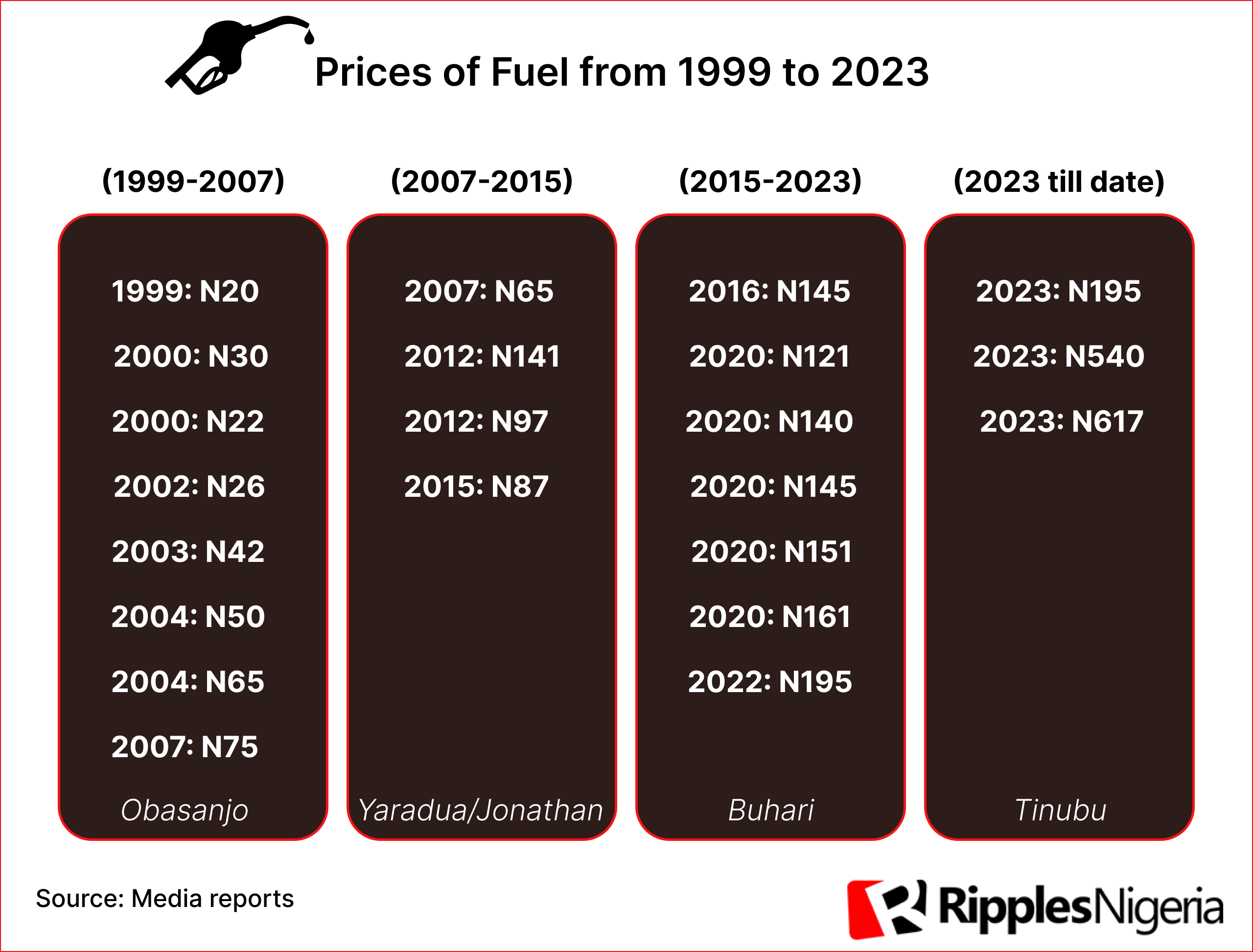Ripples Metrics
RipplesMetrics: Examining the cost of fuel by Nigerian govts since 1999

Despite being an oil-producing country, Nigeria still struggles with the availability of premium motor spirit, commonly called petrol or fuel for its over 200 million inhabitants who depend on it for almost everything.
Petrol is commonly used for transportation and electricity. The National Bureau of Statistics says that, as of 2018, about 11.8 million vehicles in Nigeria ply the road. Also, another report said that 92 million Nigerians need access to electricity. Many of these people depend on electricity generated from fueling a generator.
However, this increasing demand for fuel consumption has been challenged by the rising pump price of fuel sold within the country.
Several factors like the absence of functional refineries, oil theft and spillage as well as the global oil market contribute to the problem mentioned above but the initial is significant. For this reason, Nigeria exports its crude oil to other countries to refine and buy it to be sold back in the country.
In July 2023, the price of fuel peaked at over N600 across several states in the country. This development followed the removal of fuel subsidies by the new administration led by President Bola Ahmed Tinubu.
Tinubu was inaugurated on May 29 and during his speech he announced the removal of the subsidy immediately. This announcement immediately raised the petrol price at the pump station by over 100 per cent from an average of N200 to over N500.
In the past, former administrations had allocated funds for fuel subsidy. The former Secretary to the Government of the Federation, Boss Mustapha, said that Nigeria spent 13 trillion on fuel subsidy in 16 years.
READ ALSO:FACT CHECK: Was Justice Tsammani’s home attacked over judgment on Tinubu?
Although there have been attempts by past presidents to stop subsidizing fuel, this, even when it was implemented, came with a lot of criticism and protests leaving the president to revoke the order.
In 2016, President Muhammadu Buhari removed the subsidy on fuel which jacked up the price from N87 to about N145. But this was later restored. Also, in 2012, President Goodluck Jonathan removed the subsidy. This development was followed by a nationwide protest called “Occupy Nigeria”. As of then, Jonathan claimed to be spending $8 billion in a year to subsidize fuel.
Prices of fuel under different administration
Between 1999 and 2007, under President Olusegun Obasanjo’s administration, data gathered by RipplesMetrics shows that fuel prices changed at least seven times, rising from N20 to N75 per litre. This is over 200 per cent increase in eight years.
As of June 2000, fuel price rose from N20 to N30 per litre. It later dropped to N22 per litre. By January 2002 the price was N26, then it increased to N42 in 2003, N42, N50 and N65 in 2004 and finally N75 per litre in 2007.
From 2007 to 2010, the price of fuel dropped from N75 to N65 per litre. This was under the administration of President Umaru Yar’Adua.
Under President Jonathan, fuel prices, for the first time rose above N100 per litre due to the removal of subsidy. As of 2012, the price rose from N65 to N141 per litre. After the protest, it dropped to N97 per litre and by 2015, when the president left office, the price was N87 per litre.
Between 2015 and 2023, under President Buhari, the price of the product rose from N87 to N195 per litre, over 124 per cent increase.
In 2016 fuel price was N145 from N87 per litre. By 2020, it dropped to N121 and later revolved around N140, N145, N151, and N161 per litre. By 2023, when the president was leaving office, the fuel price was N195 per litre.
Now, with the removal of the subsidy on May 29, by President Tinubu, the fuel price has risen from N195 to N540 per litre in June and now N617 per litre as of July 2023.
RipplesNigeria, in several reports, had captured how this development has led to the increase in transportation, and inflation rate which is at 22.79 percent as of June 2023 and posing economic challenges to small businesses and students. There are also developments in the National Assembly probing the increasing prices within one month, a palliative scheme by the federal government to cushion the effect of the subsidy and a move by the government to increase the allowance of workers.
With all these developments, there are speculations that the prices might still increase in the coming months if regulations are not put in place or the planned Dangote refinery, which ahould lessen the importation of fuel, does not start as planned in August.
By James Odunayo
Join the conversation
Support Ripples Nigeria, hold up solutions journalism
Balanced, fearless journalism driven by data comes at huge financial costs.
As a media platform, we hold leadership accountable and will not trade the right to press freedom and free speech for a piece of cake.
If you like what we do, and are ready to uphold solutions journalism, kindly donate to the Ripples Nigeria cause.
Your support would help to ensure that citizens and institutions continue to have free access to credible and reliable information for societal development.






















